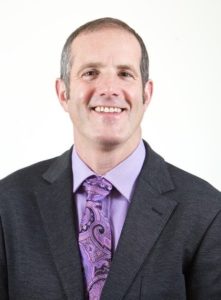 O’Connor will lead the Center for the Protection of Intellectual Property and expand innovation and entrepreneurship programs.
O’Connor will lead the Center for the Protection of Intellectual Property and expand innovation and entrepreneurship programs.
Professor Sean O’Connor, noted innovation law scholar, is joining George Mason University’s Scalia Law faculty as a tenured full professor and Executive Director of the Center for Protection of Intellectual Property (CPIP). He will continue the renowned CPIP programming while also expanding it into innovation and entrepreneurship law more broadly. O’Connor will lead development of new clinics and the law school’s participation in university-wide multidisciplinary initiatives such as the proposed Institute for Digital InnovAtion (IDIA).
“The time is right for George Mason and Northern Virginia to mature into the world class tech and innovation hub that is already emergent,” says O’Connor. Henry N. Butler, Dean of Scalia Law, embraces the move, “given CPIP’s impact on IP to date, our location, and the arrival of Amazon’s HQ2, the law school is perfectly situated to expand CPIP’s sphere of influence into innovation and entrepreneurship law.”
O’Connor, a Stanford Law graduate, practiced law at multinational firms based in New York and in Boston before entering the academy. He has served as general counsel to innovative start-ups, creators, and nonprofits. He has testified before Congress and the Washington State Legislature, and has presented at the Federal Trade Commission and U.S. Patent & Trademark Office. O’Connor has been a visiting professor at University of California at Berkeley, Boston College, George Washington University, Université de Strasbourg, Université de Bourgogne and Katholieke Universiteit, Lueven (Belgium). He has lectured in China, India, Saudi Arabia, Israel, and Cuba.
O’Connor designed and launched pioneering programs, including the Entrepreneurial Law Clinic, the Cannabis Law and Policy Project, and the Law, Business and Entrepreneurship Program at the University of Washington. He helped build the Program in IP Law and Policy and expand the well-known Center for Advanced Studies and Research on Innovation Policy (CASRIP). As Assistant Dean for Law, Business and Technology Initiatives, he oversaw these programs while serving as Chair of the University IP Management Committee and on the committee that designed the Global Innovation eXchange (GIX). A former professional musician and songwriter, O’Connor now taps that background to organize conferences, produce scholarship, write amicus briefs and op-eds about various aspects of the music ecosystem.
As a scholar, O’Connor has been published in top law reviews, including University of Chicago Law Review, Boston College Law Review, and University of Illinois Law Review. He has published numerous book chapters and authored commissioned reports for National Academies of Science and other organizations. He is currently completing a book, The Means of Innovation: Creation, Control, Method+ology, and serving as Editor for a new Handbook of Music Law & Policy, both to be published by Oxford University Press.
As part of the leadership transition at CPIP, Founder and Executive Director Professor Adam Mossoff will be stepping down to return to the faculty. Mossoff’s tireless efforts and boundless enthusiasm, along with those of fellow CPIP Founder Mark Schultz, propelled CPIP to become a leading unique voice in the IP academy. By providing a counterweight to increasingly IP skeptical academic centers, in six years Mossoff and Schultz took CPIP from design and inception to a powerhouse center running programs around the world, coordinating amicus briefs, and issuing policy briefs. Responses to CPIP from government, NGOs, and industry have been overwhelmingly positive.
“Scalia Law is delighted that Professor Mossoff will be able to return his focus to his scholarship and teaching, a big plus for the school, as he winds down a period of extraordinary service in building CPIP,” notes Scalia Law Dean Henry N. Butler.
“CPIP quite simply would not exist, or have come this far, without Adam’s leadership. The organization that he and Mark built is a superb platform from which to expand further into innovation and entrepreneurship,” observes O’Connor.
CPIP continues with its excellent staff: Professor Sandra Aistars, Director of Copyright Research and Policy & Senior Scholar; Kevin Madigan, Deputy Director; Kristina Pietro, Director of Operations and Events; Professor Devlin Hartline, Assistant Director, Communications and Publications; Chris Katopis, Assistant Director; and Mary Clare Durel, Program Assistant. Senior Scholars include: Jonathan Barnett, USC Gould School of Law; Eric Claeys, Scalia Law School; Chris Holman, University of Missouri KC School of Law; Erika Lietzan, University of Missouri Columbia School of Law; Kristen Osenga, University of Richmond School of Law; Eric Priest, University of Oregon School of Law; and Ted Sichelman, University of San Diego.

